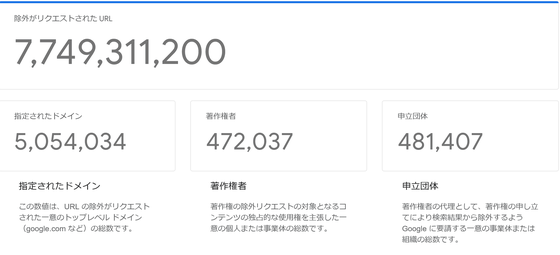The number of DMCA deletion requests to Google due to copyright violations is increasing day by day, reaching an all-time high. What are the causes and actual situation?

As part of its efforts to combat copyright infringement, Google takes measures to remove or remove content that is suspected of infringing copyright from appearing higher in Google search results. Most of these requests are in accordance with
Google Sees DMCA Takedown Requests Surge to New Highs * TorrentFreak
https://torrentfreak.com/google-sees-dmca-takedown-requests-surge-to-new-highs-240110/

In 2012, Google added a section titled ' Exclusions of Content Due to Copyright Issues ' to its Transparency Report , which publishes privacy, security, and access to information data. This page records the total number of URLs that have been DMCA requested, the domains that have been designated as infringing, and the number of copyright holders and organizations that have made requests. According to this, the total number of requests up to the time of article creation was 7,749.31 million.

According to Fred von Lohmann, a former senior copyright advisor at Google, in 2012 the number of DMCA requests processed was more than 250,000 per week at peak times, which is more than the number of requests traditionally received in a year. It seems that there were more than a few.
The number of DMCA requests has been increasing year by year, and when Google first announced the number of requests, it was several million per year, but in 2016, the number of requests exceeded 1 billion per year. By 2022, there will be 680 million URLs that have been blocked, and 40% of them were 'preemptive deletions' in which the URLs were deleted without ever appearing in search results. Google reports.

The graph below shows the trend in the number of DMCA requests published by Google, as shown by TorrentFreak, a media that disseminates copyright-related news. The vertical axis is the total number of requests, and the horizontal axis is the elapsed time every two years. The graph shows that the number has been increasing over time since its release in 2012, but the increasing trend has slowed down slightly since around 2017. This means that countermeasures against sites that infringe copyrights include not only deletions in response to DMCA requests, but also various anti-piracy algorithms that lower the ranking of pirated sites and prevent pirated content from being displayed in search results. Measures have been taken to make it more difficult. As a result, the number of deletion notifications processed by Google seems to have temporarily decreased.

However, although efforts to lower the ranking of pirated sites continue, the period when the number of DMCA requests was on the decline was short-lived, reaching a record number of requests around 2022. As of January 2024, Google processes more than 30 million removal requests per week, or approximately 50 per second, or more than 1.6 billion per year.
The cause of this situation is the ``copyright trolls'' who make a large number of lawsuits to ``obtain financial benefits by pursuing individual uploaders of pirated content and bringing them to settlements'' by exercising copyright. ” is increasing, which may be one reason. It is said that a record number of copyright lawsuits were filed in 2022, and in 2023, the number of lawsuits was 57% higher than in 2022. Some companies send hundreds of millions of requests in a few months, so it can be assumed that this is influencing the increasing trend.
What are the 'copyright trolls' who abuse copyright for commercial purposes while adult content companies are filing a record number of copyright lawsuits? -GIGAZINE

Also, according to TorrentFreak, in the past, most DMCA requests were carried out by rights holders or rights organizations, but now in some cases agents specialized in DMCA requests are in charge. Therefore, TorrentFreak predicts that how Google's number of deletions will change in the future will depend mainly on the actions of these agencies, ``However, there is a possibility that a completely new anti-piracy organization will emerge and take over.'' 'There's never a dull moment in this industry.'
Related Posts:
in Web Service, Posted by log1e_dh






